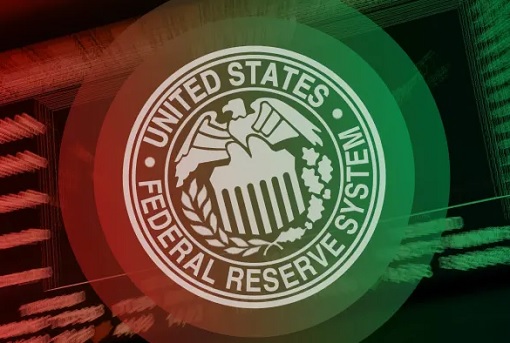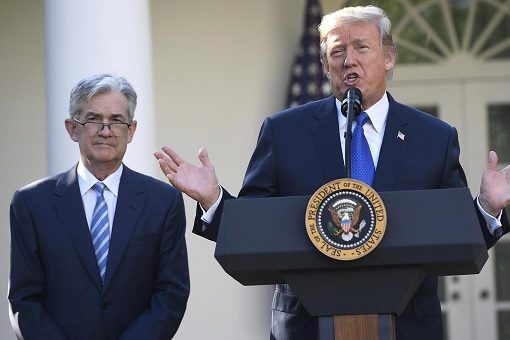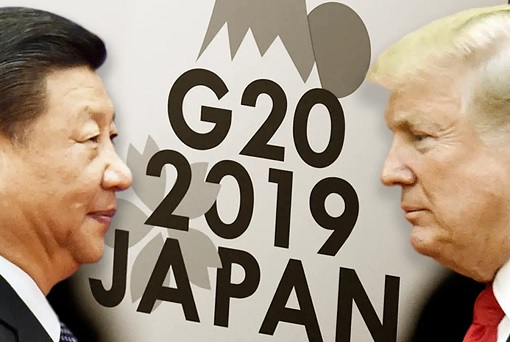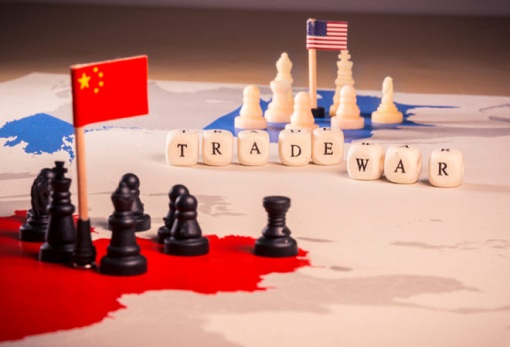If the United States’ economy is in bad shape due to its trade war with China, how come its stock market has been so bullish lately? The S&P 500 is about to pull off its best first half of a year in at least 10 years and the Dow Jones Industrial Average (DJIA) is enjoying its best June since 1938. That is one hell of an impressive rally, is it not?
Actually, the stock market’s strong comeback in June has little to do with economic fundamentals. It’s largely driven by the shift in Federal Reserve’s monetary policy. Last year alone, the FOMC (Federal Open Market Committee) had raised the fed funds rate 4 times – 1.75% (March), 2.0% (June), 2.25% (September) and 2.5% in December.
The 2008 recession triggered by sub-prime crisis caused the Fed to lower its benchmark rate to 0.25% – that’s effectively zero percent. And it had stayed there 7 years until December 2015, when the Fed raised interest rates to 0.5% for the first time. In total, since the 2015’s hike, the Fed has raised rates 9 times. In fact, in Dec 2018, the Fed projected 2 more rate increases in 2019.

But the central bank abruptly and stunningly changed its tune early in this year. By March, the Fed removed entirely projections for future rate increases. Not only will there be no rate hikes for 2019, Jan Hatzius, Goldman Sachs chief economist, said there would be 2 rate cuts instead. Why? There’re 2 primary reasons – weakening economy and growing political pressure from Trump.
Donald Trump, before winning his 2016 presidential election, had consistently accused the Fed (under the leadership of Janet Yellen) of creating a “false economy” that made Barack Obama look good – by keeping interest rates low. Trump complained and bitched that the Fed’s work to keep interest rates artificially low benefits the wealthy at the expense of the poor.
But when Trump becomes the U.S. president, and the Fed raised the interest rates 4 times last year, causing the stock market to plunge, the president was like a cat on hot bricks – terribly upset. Mr. Trump has criticized the Fed’s 2018 interest rate increases for slowing growth and told it to start using its tools to stimulate the economy. In fact, the president has threatened to demote or fire Jerome Powell.

President Trump lectured Powell, Chair of the Federal Reserve, that the U.S. economy will “shoot up like a rocket”, if the benchmark rate is lowered by 1 percentage point. Everyone agrees that Trump, together with the Wall Street, is bullying the Fed. And Powell, afraid of being made the scapegoat should the recession kicks in, is responding according to the wish of the markets.
But according to Gary Shilling, the economist known for correctly predicting bubbles like the sub-prime of 2008, America is already in recession. He said 2 days ago in an interview – “I think we’re probably already in a recession, but I think it will probably be a run-of-the-mill affair, which means real GDP would decline 1.5% to 2%, not the 3.5% to 4% you had in the very serious recessions.”
Shilling offers reasons for an economic pullback – heavy corporate borrowing, a strong dollar that’s pinching emerging markets, weak housing data and declining industrial production due to trade wars. Indeed, the stock markets appear to be dancing to the tune of the US-China trade war, as can be seen in the latest waiting game of this week’s G-20 Summit in Japan.

J.P. Morgan on Wednesday (June 26) said there’s “something wrong” with the stock market rally this round. Analyst Jason Hunter said the reason is pretty simple – cyclical stocks typically linked to economic growth have failed to rally. Companies whose stocks are cyclical include car manufacturers, airlines, furniture retailers, clothing stores, hotels, and restaurants.
When the economy is doing well, people can afford to buy new cars, upgrade their homes, shop, and travel. In essence, cyclical stocks are companies that consumers choose to spend less with and cut back on during a recession. But the S&P 500′s new high was actually contributed by defensive companies like consumer staples sector and utilities – goods and services that people continue to demand.
Therefore, the rally can only persist for a short period of time. In order for the Bull Run to last, cyclical stocks have to take the lead in the rally, which has yet to happen now. Another red flag that points to an unconvincing rally is the Russell 2000 – index for small caps – which typically related to economic growth. This index has fallen into correction territory in May and has not recovered.

The point is this – if the U.S. economy is doing great in spite of the trade war with China, why is Trump so desperate wanted the Fed to cut interest rates? If the U.S. Treasury is indeed getting US$100 billion free money from the Chinese, as Trump would like everyone to believe, why should Trump even care meeting with President Xi Jinping at the coming G-20 to strike a trade deal?
If it’s true that in the present trade war climate, China is suffering alone while the U.S. is not only unaffected, but also gets US$100 billion from the Chinese, should not Trump go ahead and slap US$300 billion worth of remaining Chinese goods, and in the process pocket hundreds of billion of dollars more? There is no compelling reason to negotiate with Beijing, is there?
More than 300 American companies have begged Trump administration to find a way to end the trade war with China. Sales of new U.S. homes slumped 7.8% in May, as sales plunged in the pricier North-eastern and Western markets caused by lack of Chinese investors. FedEx has just lost US$2 billion in the quarter ending May 31st. What do all these mean?

Other Articles That May Interest You …
- Trump Blinks? – The U.S. Slaps New Economic Sanctions After Calling Off A Military Strike On Iran
- What Trump Doesn’t Want His Supporters To Know – China Lowered Tariffs To Everyone Except The U.S.
- China’s Trade Surplus For May Hit $41.65 Billion – Trump Threatens Xi To Meet Him At G20 Summit … Or Else
- “Best Friend” Russia To Fill China’s Food Gap As Trade War Forces The Boycott Of U.S. Meat & Soybeans
- From Trade War To Tech War – After 5G Technology, The US Aims To Cripple China’s Artificial Intelligence
- Watch Out Trump!! – China May Weaponize “Rare Earth” To Retaliate Against U.S.’ Ban On Huawei
- China’s New Message To The U.S. – “Negotiate – Sure!”, “Fight – Anytime!”, “Bully Us – Dream On!”
- Trump Is Bluffing – He Will Not Let The Stock Market Collapse, And He Lied About Forcing China To Pay $100 Billion
- China Reveals Strategy To Fight U.S. Trade War – Stop Buying American Debt

|
|
June 27th, 2019 by financetwitter
|


|

|

|

|

|

|




























Great analysis, so we are waiting for a black Swan event to make it official.